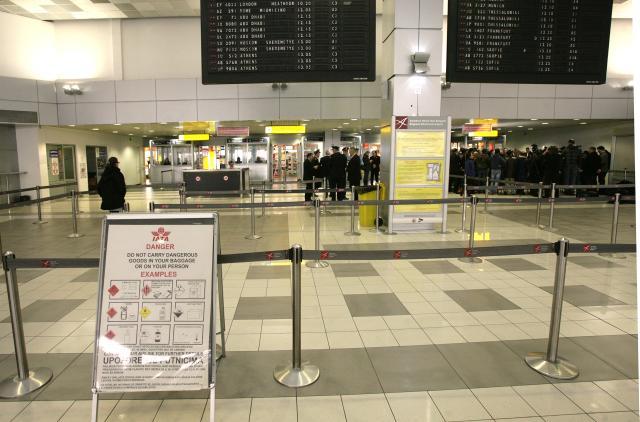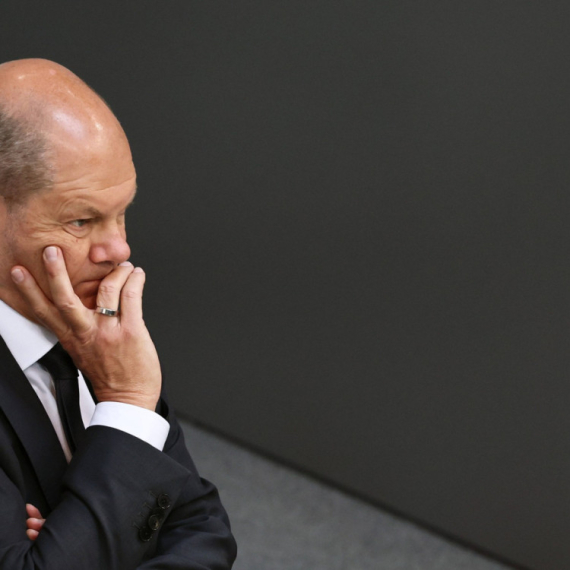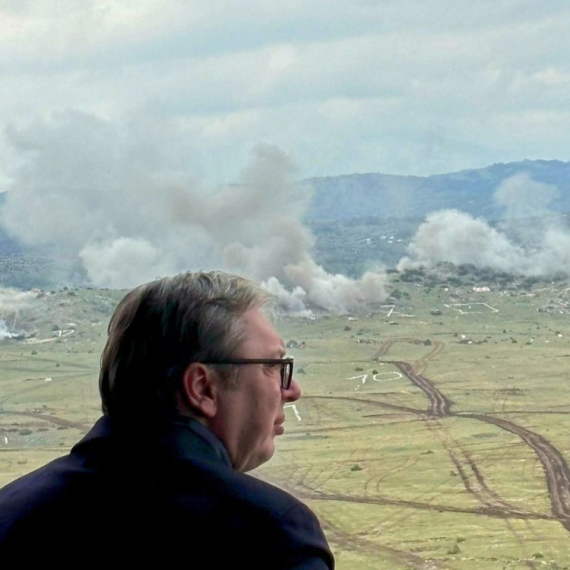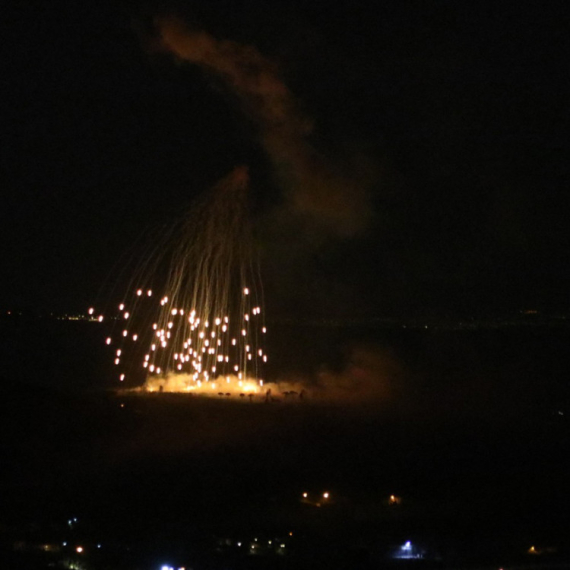Who’s bringing down Airport?
Tuesday, 02.02.2016.
11:51

Who’s bringing down Airport?
Telekom got off the hook, we haven’t sold it. The Airport is next…Serbian Government for three years now promises under the principle “as soon as possible” to sell Airport "Nikola Tesla" where it has 83,15% of ownership share. On the first day of an Orthodox Serbian New Year, Prime Minister Aleksandar Vučić had once again informed the public that Airport “Nikola Tesla” will be privatized till the end of year, regardless of the privatization model (classic privatization, concession or private-public partnership). As well as in the case of Telekom, Prime Minister started to make a bid, so he got as far as to the amount of EUR 500 million, but he hadn’t missed the opportunity to say that “earlier estimates say that it would be possible to get EUR 100 million for concession". Prior to this, Prime Minister had given another estimate (on October 6, 2015) announcing on that occasion the "EUR 500-600 million plus EUR 1 billion in investments, including termination clause".
On a recent press conference, no one from the present reporters hadn’t thought of asking Prime Minister how he came up with the sum of EUR 500 million, and who had “on earlier occasion” estimated the value of “EUR 100 million". Moreover, where the sum amounting to EUR 1 billion from his former statement had vanished for the sake of investments?
Prime Minister had revealed yet another incredibly significant detail that many had missed. Namely, he said that "we work on the selection of privatization counsellor, as six companies that submitted applications were not satisfied with the commission fee, asking for more money. Now, we are going to enter into direct negotiations and we will look for the best", Aleksandar Vučić underlined.
A consultant in certain foreign counselling company that took part in many privatization processes in Serbia and the region claims that disrupting the process of selecting privatization counsellor in the mid of tender procedure as well as the decision to negotiate directly – means only an open opportunity for corruption.
However, it hasn’t passed ten days after Prime Minister’s “bid”, when on January 21, Belgrade Exchange Stock Market issued an awkward news that the price of the Airport faced with downfall again, and that it is worth three percent less than a day before.
If we look for a reason “at first glance” of the devaluation of Airport shares, then it would be journalistic "bomb" that on December 30, 2015, Serbian Government had honored Air Serbia with absolving Airport’s debt in the amount of USD 22 million for the performed services in the period from 1.10.2014 to 18.09.2015. A year prior to this, the same thing happened at around the same time, while the Government had written off the debt amounting to EUR 17.6 million. In two year period, by the decision of Government, the Airport remained “short” for USD 40 million, which can be a serious reason for devaluating the shares on the Stock Market.
Certain brokers, however, are inclined to another cause – share devaluation are being attributed to the alleged insecurity regarding the future ownership structure of the Airport – whether to sell majority package or the airport will be given to concession. According to Prime Minister’s announcement, there is no uncertainty – the Government had opted for concession.
The supporters of the third theory state classic reason – the company is not performing well and it had generated losses, so it is logical to be poorly rated on the Stock Exchange market. There is some truth in it, but in the second quarter of 2015, the Airport had faced with the fall of net profit amounting to 32% compared to the same period in 2014. Third quarter had brought the continuation of revenue dropping trend from the second quarter, with 40% of decrease of business in the overall aviation, 40.000 of charter passengers less and a huge drop in revenues. All of this caused business loss amounting to around EUR 1 million, for the first time in the Airport history, which is for EUR 7.4 million worse results th69 flights per week less, meaning around 100.000 passengers less, the number of arrivals/departures dropped for 10,2% compared to 2014, while in December, there were 6.1% less passengers than in the same month a year earlier. On the other hand, bad business results and incapable management of the state monopolistic company are being covered with the stories of “historical success”, “European Champions”.
There is yet the fourth reason of the devaluation of the Airport shares on the Stock Exchange Market. According to what has been going on around the Airport for the last year, it could be reasonably suspected that someone is doing this on purpose, or due to ignorance, dropping the value of this state company prior to the announced privatization process.
This is why we should not so easily disregard the stock market’s information on shares falling, especially when we consider time perspective.
For the sake of example, one share of Airport was worth RSD 1.488 on April 16, 2015, while on January 21, 2016 – it is worth RSD 921. As the analysts would say - the trend of a long term devaluation amounting to spectacular 37% in eight month period is pretty obvious.
This drop is even more evident on the market capitalization (the company value) – on January 21, 2016, Airport was worth EUR 260 million on Belgrade Stock Exchange.
Exactly 10 months ago, while talking about Government’s decision to find concessionaire for Airport, assistant minister for air traffic Zoran Ilić stated (B92, March 23, 2015) that Air Serbia is responsible for the “increase of the value of Airport and that this is why the price went ups ome EUR 400-500 million".
However, official stock information on market capitalization of the Airport dating August 18, 2015, shows that the company is EUR 367 million worth. Then, on November 16, 2015, it was worth EUR 335 million. Right after New Year (on January 6, 2016), it was worth EUR 314 million. Finally, on January 21, 2016 – Airport’s worth dropped to EUR 260 million.
What those digits show?
That the stock market’s value of the Airport dropped for EUR 75 million in two month period (November - January), or EUR 100 million in five month period (August - January), or EUR 140 million in ten month period (March 2015 - January 2016), according to a very conservative estimate.
Devaluation of shares is not unusual at all, but it is totally confusing when it goes parallel with political reactions along with those stock digits. Namely, while the shares dropped, politicians in the same time persistently talked about Airport’s spectacular business performance, “like never before in its history, since 1962".
How to explain this phenomenon?
On first glance, the company is being praised publicly on political stage, while secretly, behind the scenes, its value has been undermined, which is not noticeable by simple watching, but it is obvious considering stock exchange index.
"It is not strange to praise the work of airport, while its shares drop in the same time", one of the most informed and highly experienced aircraft expert commented on this in Belgrade. His thesis was that the value of the Airport is being consciously dropped prior to privatization, thus warning: "The party that is going to sell Airport in the end, should not think of selling it under the price of EUR 700 million, everything below this amount would be a proof that someone “made a deal” in this business".
Financial forensic expert supports this thesis, that carefully monitors and analysis air-business in Serbia. He reminds us of the words of some former ministers that, in negotiation process with Etihad regarding the establishment of Air Serbia, frequently used the wording “taking over the Airport”. That made a part of expert public believe that Airport is promised to Etihad. Sources from Belgrade business circles claim that in the mid of last year, the owner of one consultant company had convinced the owners of Abu Dhabi and the management of Etihad to buy “Tesla” and that they accepted.
Etihad’s interest for Belgrade Airport is being considered for two reasons.
Highly ranked insider within the company “Airport Nikola Tesla” explains the first reason: "What does Etihad want? They are for longer time interested in flights towards U.S., but they don’t have necessary category and U.S. aviation authorities refuse to issue them license for landing, as they believe that they violate free competition. Belgrade Airport got necessary license and Etihad will reach America, as well as slots on U.S. airports. Etihad is solely interested in this. Belgrade Airport will become air transit harbor next year from where Etihad would be able to fly in all parts of the world where it was limited so far".
It was not a secret that the whole Etihad strategy since its entering into Air Serbia is to secure monopolistic position on the Airport “Nikola Tesla” for its joint company, and to squeeze out competitive airline companies. Since the establishment of Air Serbia - 14 airliners had abandoned flights to Belgrade due to discriminatory attitude of the Airport towards them. Stock exchange expert Nenad Gujaničić stated that “it is most disputable why the Airport is put into Air Serbia’s service, which is evidently being favored". Preferential treatment of Air Serbia and bad treatment (there are signs of expelling foreign airlines that are the only ones paying services to the Airport) are just some of the reasons for the great loss Airport had generated.
Above mentioned financial forensic expert stresses the other reason of Etihad’s interest. He thinks that Etihad was aware that this business will not be useful when entering into partnership with former JAT, and establishing Air Serbia, but it nevertheless entered into this ‘deal’ as it “smelled” the chance to make revenues from “surrounding” airline businesses – technical services, catering and support. There was no problems when it comes to technical services and catering (one hangar was taken over and the airport building), but supporting services turned to be problematic, and it is rather profitable business. So far, support services (reception and shipping of passengers and freights) were done exclusively by Air Serbia, generating good revenues. Credible sources from Belgrade Air Port claim that Air Serbia (meaning Etihad) was the one that ultimately requested from the Airport to enter into new investments, to modernize its existing terminal and to build a new one. But, in this new profitable business, here comes competition - Sky Partner Company to which Directorate of Civil Aviation had to issue working license (license was issued on October 10, 2015) in accordance with the rules of the Agreement "Open Sky" which request at least two “handing” operators on the Airport (due to easier understanding, this is “the toll gate for airplanes, such the one existing in Bubanj Potok for cars). Sky Partner is Serbian company established by airline SAS (in the meantime taken over SWISS) and Paris Airport Orly.
As for privatization, there is one paradox – as more investors there are, the value of the Airport is getting lower, instead vice versa. On numerous occasions, government officials had announced new investment, cutting the ribbon on modernized and new airport facilities. In the company newsletter "Terminal", Saša Vlaisavljević, acting director of Airport, had introduced the employees on November 12, 2014 that "Memorandum of Understanding has been signed last week between the Government, Group VINCI and the Airport with the aim of finding most favorable model of financing the reconstruction and extension of airport facilities, with preliminary estimate amounting to around EUR 600 million".
When it comes to "reconstruction and expansion", Prime Minister Vučić also had something to say, while touring and visiting the members of Border Police on March 8, 2015, presenting them with the flowers for holiday, underlining that "reconstruction is inevitable, as well as capacity expansion in order for the airport to improve its functionality". Acting Director Vlaisavljevic had immediately elaborated on this, explaining that they will expand Airport’s capacities for 40%, in order for it to receive some 7.5 million of passengers on annual basis.
Aircraft traffic experts with long lasting memory claim that Airport "Surčin" had 5 million of passengers annually, back in 1990, and that this was achieved with 46% of overall capacity usage that was projected for 10 million passengers.
Out of all these investments, the imagination of the people was teased by a new take-off and landing track which was constant “subject of sweet dreams” of the politicians and company’s management. It is interesting, however, that no one mentions (military) airport in Batajnica that has two airstrips and is only several kilometers away from "Nikola Tesla". The truth is that the airstrip that is being used is in a bad shape, while the one that is not functional is in pretty much better shape, but lack lighting (which according to some estimates could cost around EUR 150.000). It is quite unknown that some 12-13 years ago, Vienna Airport was interested in acquiring Batajnica Airport, which also bought off the airport in Bratislava. Viennese delegation was visiting Batajnica and then dropped out due to two reasons. The first one was the closeness of “wild” residential area which announcement of being teared down caused protests around the airport (this was the impression of the delegate’s members), while the other was – contaminated land around the airport. The example of military airport of a former communist state is known for which cleaning in turning it into a civil airport EUR 12 million were spent, and the process lasted for five years. Due to those two reasons, Viennese delegation had withdrawn from Batajnica.
However, experts claim that Belgrade airport could immediately get the second airstrip – outside of Belgrade. They point at Nis Airport when mentioning this. One precondition was already achieved – on September 16, 2014, Work groups of Belgrade and Pristina had reached agreement in Brussels according to which the citizens of Kosovo can travel into third countries via airport in Serbia, based on temporary travel documents. This would be a kind of bate for a low cost airliners to come to Nis. The second precondition remains to be achieved, and that is high way from Nis to Pristina, which would be financed, according to Prime Minister Vučić (Tanjug, August 31, 2014), by European Union. Still, nobody works on this option.
Prior to privatization process starts, as owner of Airport, the Government should inform itself how other privatization process in the surrounding countries went by, especially as it claims that airport is the leader in the region.
Among the first to be sold was the airport in Budapest ("Ferihegy", i.e. "Liszt Ferenc Airport"). Privatization commenced in 1998/99, and it was finalized in 2006. The first buyers were the British, paying for it EUR 1.4 billion (HUF 430 billions). Then, the British resold it to a Spanish business group, which then resold it to the consortium composed of a construction company from Berlin and a financial fund. Eventually, the airport ended up in majority ownership of the Canadian Pension Fund. No one ever found out how much money had circulated in those international transactions. Ferenc Kovač, former director of the extinguished Hungarian Airliner Malev states that: "Airport is based on the policy of transit passengers shopping while waiting for their flight”. This airport has the same airstrip today, accompanied by two terminals, while shopping center was built in between. From the aspect of aviation, airport is not developed in the scope it should be. Only access infrastructure was built, but the hotel was not constructed, nor the terminal building, cargo center… The parking cost was increased, and a commercial facility was constructed given that the owners wanted to draw the invested funds out". Prior to airport privatization, it serviced 3.5-4.5 million of passengers on annual basis, while nowadays it can serve 9.5 million, mostly due to low-cost airlines.
Zagreb Airport was given at the beginning of 2012 to the consortium of French companies Bouygues Bâtiment International and Aeroports de Paris Management to a 30-year concession. Concessionaire had obliged to constructed new passenger terminal, and to manage the airport that should serve five million passengers on annual basis (now, it is 2.5 million passengers). Contracted investment of the concessionaire amounted to EUR 331 million, while concession revenue in 30 years should reach EUR 1.9 billion. However, it could easily happen for the whole deal to go down as the concessionaires requested to raise the price of airport services, but Croatian politicians opposed it, with the justification that they do not want to “upset” the public. They had reached compromise by signing tree secret annexes to the contract which allow concessionaire to increase airport fees, but two years later – so local fee was increased from €4 to €7, international fee from €10 to €15, while the fee for protection of air traffic increased from €3 to €6.5.
Ljubljana Airport "Jože Pučnik" was sold (75.5% state owned) in September, 2014, for EUR 234 million to the German company Fraport AG. Experts say that Fraport made heavily investments in order to reduce operative costs of flying from Ljubljana to the German airports-hubs for long airline traffic, not for the sake of developing air traffic in itself.
German Fraport had appeared also as regional actor when last summer it bought off concession to manage 14 Greek regional airports for the amount of EUR 1.23 billion to the period of 45 years. Greek left oriented Government agreed on this transaction after a long period of reluctance, pressured by European trustees and IMF.
The entrance of Fraport in the region coincided with better political and economic relations between Serbia and Germany, and it opened up the issue of whether this giant operator in air traffic could show up as interested concessionaire for the Airport "Nikola Tesla". There are opinions that Serbian Prime Minister Vučić is in the mid of his obligations towards his partners from Abu Dhabi on the one hand, and political loyalty towards German Chancellor Angela Merkel on the other, and that he hadn’t “made up his mind” yet. Maybe IMF could help him make the decision easier as in its last Memorandum signed with Serbian Government, it also included privatization of “Nikola Tesla” Airport (its price excluding, though).



























































Komentari 1
Pogledaj komentare